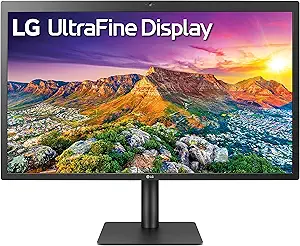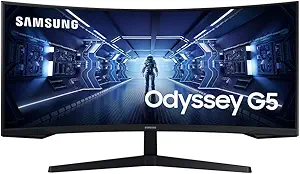In the realm of monitor supremacy, two giants stand tall: LG and Samsung. Renowned for their innovation, quality, and diverse offerings, both brands have captured the hearts of consumers worldwide. As you embark on the journey to find the perfect monitor for your needs, let's unravel the strengths and distinctions of LG and Samsung monitors to guide you toward the ideal choice.
Key Features Comparison
Size
Samsung and LG are two of the leading brands when it comes to monitors, particularly in terms of size. Samsung offers a wide range of monitor sizes, from compact 24-inch screens to expansive 49-inch ultra-wide displays. Their latest technology, the Samsung Odyssey G9, boasts a massive 49-inch screen with a 32:9 aspect ratio, providing ample space for multitasking and an immersive gaming experience. However, the large size of some Samsung monitors may not be suitable for all users, as they can take up a significant amount of desk space and may be overwhelming for some users. On the other hand, LG also offers a diverse range of monitor sizes, from 24 inches to 38 inches. Their latest model, the LG UltraGear 38GN950, features a 38-inch screen with a 21:9 aspect ratio, providing a wide viewing area without being too overwhelming. LG's monitors are generally more compact and desk-friendly compared to Samsung's ultra-wide models. However, they may not provide the same level of immersion for gaming or multitasking. In comparison to other brands, both Samsung and LG offer larger monitors, but Samsung tends to offer larger sizes, while LG focuses on a balance between size and usability.
Response Time
Samsung and LG are both renowned for their high-quality monitors, each offering a range of models with varying response times. Samsung monitors, particularly those within the Odyssey line, are equipped with a rapid 1ms response time. This ensures minimal input lag, providing a smooth visual experience ideal for high-speed gaming and fast-paced action scenes in movies. However, it's worth noting that some users have reported instances of ghosting with these monitors, a common issue associated with fast response times. On the other hand, LG monitors, such as those within the UltraGear series, typically offer a slightly slower response time of around 5ms. While this may not be as fast as Samsung's offering, it's still quick enough to provide a seamless visual experience for most users. The slower response time can also help to reduce instances of ghosting, providing a clearer image overall. However, for competitive gamers or those who require the fastest response times possible, LG's monitors may not be the best choice. Comparatively, both brands offer high-quality monitors with fast response times, though Samsung may hold a slight edge for those requiring the fastest speeds.
Panel Type
Samsung and LG are both renowned brands in the monitor industry, offering a variety of panel types to suit different user needs. Samsung monitors often utilize Quantum Dot (QLED) and Vertical Alignment (VA) panel technologies. QLED technology, which involves the use of quantum dots to enhance performance, offers high levels of brightness, excellent color accuracy, and a wide color gamut. VA panels, on the other hand, are known for their high contrast ratios, deep blacks, and robust colors, although they may suffer from slower response times and less accurate color reproduction compared to other panel types. On the other hand, LG monitors predominantly feature In-Plane Switching (IPS) and OLED panel technologies. IPS panels are lauded for their superior color accuracy and consistency, wide viewing angles, and fast response times, making them ideal for professional graphic design and video editing. However, they typically have lower contrast ratios compared to VA panels. LG's OLED technology, which involves the use of organic compounds that emit light when electricity is applied, offers exceptional contrast ratios, true blacks, and a wide color gamut, but may be prone to image retention or burn-in over time. When compared to other brands, Samsung and LG monitors stand out for their innovative use of QLED, VA, IPS, and OLED technologies to deliver high-quality visuals, although each panel type has its strengths and weaknesses.
Affordability
When it comes to price, both Samsung and LG monitors offer a wide range of options to cater to various budget constraints. Samsung monitors, known for their Quantum Dot technology and high refresh rates, are typically priced higher, especially their flagship models like the Samsung Odyssey G9. This monitor, boasting a 49-inch display with a 32:9 aspect ratio, is one of the most expensive in the market. However, Samsung also offers more affordable options in their lineup, such as the Samsung S24F350FHU, which is a great choice for budget-conscious consumers. On the other hand, LG monitors are generally more affordable across the board, offering great value for money. Their monitors, like the LG UltraGear 27GL850, are praised for their Nano IPS technology and fast response times, and are competitively priced, making them a popular choice among gamers. However, their high-end models, such as the LG 38WN95C-W, which features a 38-inch curved UltraWide QHD+ IPS display, can also reach a higher price point. Overall, both brands offer a range of prices, but LG tends to be more affordable, while Samsung's pricing can be a bit higher, especially for their top-tier models.
Reputation
Samsung and LG are two of the most reputable brands in the monitor market, both known for their high-quality displays and innovative technologies. Samsung monitors are renowned for their Quantum Dot technology, which provides more vibrant and realistic colors, and their curved monitors that offer a more immersive viewing experience. They also have a strong reputation for durability and longevity. However, some users have noted that Samsung monitors can be on the pricier side compared to other brands. On the other hand, LG monitors are highly regarded for their IPS (In-Plane Switching) technology, which offers superior color accuracy and wider viewing angles. They also have a reputation for their UltraWide monitors, which are ideal for multitasking and immersive gaming experiences. LG monitors are also generally more affordable than Samsung monitors, making them a popular choice for budget-conscious consumers. However, some users have reported issues with LG's customer service, which could potentially affect the brand's overall reputation. In comparison to other brands, both Samsung and LG hold their own in terms of reputation, with each offering unique features that cater to different user preferences.
Picture Quality
Samsung and LG are both renowned brands in the monitor industry, each offering a range of models with varying picture quality. Samsung monitors, such as the Samsung Odyssey G9, are known for their Quantum Dot technology that delivers more vibrant colors and sharper contrasts. The high dynamic range (HDR) in Samsung monitors also contributes to a superior picture quality by offering a broader range of colors and greater contrast between the brightest whites and the darkest blacks. However, some users have reported issues with ghosting on Samsung monitors, which can affect the overall picture quality. On the other hand, LG monitors, such as the LG 27UK850-W, utilize In-Plane Switching (IPS) technology, which offers accurate and consistent colors that remain vibrant at any viewing angle. LG monitors also feature HDR, but their implementation has been criticized for not being as effective as Samsung's. Furthermore, LG monitors are known for their color accuracy, making them a popular choice among graphic designers and video editors. However, they tend not to have as high contrast ratios as Samsung monitors, which can make darker images appear washed out. Both brands offer 4K resolution monitors, but LG has a slight edge with its models that support 5K resolution for even sharper images.
Production Selection
Samsung and LG are both renowned brands in the monitor market, offering a wide range of products to cater to different consumer needs. Samsung's monitor production selection is impressive, with the brand offering everything from standard office monitors to high-end gaming monitors. Their latest technology, the Quantum Dot (QLED) technology, offers brilliant colors, deep blacks, and high contrast ratios. The brand also offers monitors with high refresh rates and low response times, which are essential for gaming. However, some users have reported issues with the longevity of Samsung monitors. On the other hand, LG's monitor production selection is equally diverse, with offerings for general use, professional use, and gaming. LG's latest technology, the Nano IPS technology, delivers accurate and vibrant colors, making it ideal for graphic design and video editing. LG also offers monitors with high refresh rates and low response times for gaming. LG monitors are known for their quality and durability, but they tend to be more expensive than their Samsung counterparts. In comparison to other brands, both Samsung and LG offer a wider range of monitor options, but LG's offerings are often seen as more premium.
Related Videos
Conclusion
Samsung and LG are two major brands in the monitor market, both offering a range of models with advanced technologies. Samsung monitors, particularly their Quantum Dot and High Dynamic Range (HDR) models, are known for their excellent color accuracy and contrast, making them ideal for graphic designers and video editors. They also offer a range of curved monitors, which provide an immersive viewing experience. However, some users have reported issues with the durability of Samsung monitors, and their customer service has received mixed reviews. On the other hand, LG monitors are highly regarded for their innovative features and technologies. They were one of the first brands to introduce monitors with UltraWide aspect ratios and 4K resolution, offering users more screen real estate and sharper images. LG's IPS panels are known for their wide viewing angles and consistent colors, which is beneficial for those who need accurate color reproduction for their work. However, LG monitors are often more expensive than their counterparts, and their gaming monitors, while offering high refresh rates and low input lag, do not have the same color accuracy as their professional models. When compared to other brands, both Samsung and LG offer high-quality monitors with advanced features, but the choice between them often comes down to specific user needs and budget.


















